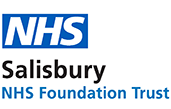Salisbury's Maternity Unit offers a full antenatal screening service. ‘Early in pregnancy’ screening is offered in line with national policy for:
- Sickle Cell Disease and Thalassaemia
- Infectious diseases – Syphilis, HIV and Hepatitis B
- Down’s, Edwards’ and Patau’s syndrome
- Anomaly Ultrasound Scan
The following websites provide more information on your screening choices:
NHS - Screening Tests
GOV.UK - Screening Tests for you and your baby
Down’s, Edwards’ and Patau’s Syndrome Screening
The combined screening test for Down's syndrome, Edwards' syndrome and Patau's syndrome is available between weeks 10 and 14 of pregnancy and consists of an ultrasound scan combined with a blood test. If you choose to have the test, the scan can be carried out at the same time as the pregnancy dating scan and a blood sample will also be taken.
At the scan, the fluid at the back of the baby's neck is measured to determine the "nuchal translucency". Your age and the information from these 2 tests is used to work out the chance of the baby having Down's syndrome, Edwards' syndrome or Patau's syndrome.
Obtaining a nuchal translucency measurement depends on the position of the baby and is not always possible. If this is the case, you will be offered a different blood screening test, called the quadruple test, when you're 14 to 20 weeks pregnant. The quadruple test only screens for Down's syndrome and is not quite as accurate as the combined test.
Test results
The screening test will not tell you definitively whether your baby does or does not have Down's, Edwards' or Patau's syndromes – it will tell you if you have a higher or lower chance of having a baby with one of these conditions.
If you have screening for all of them, you will receive 2 results
-
- 1 for your chance of having a baby with Down's syndrome
- 1 for your combined chance of having a baby with Edwards' syndrome or Patau's syndrome.
You will be offered an appointment to discuss the test results. If you have a lower chance result you should be told within 2 weeks and you will not be offered a further test.
If you have a higher-chance result, you should be told within 3 working days of the result being available and counselled appropriately by the screening team. You may decide:
- not to have any further testing
- to have a second screening test (called NIPT) to obtain a more accurate screening result before choosing whether to have a diagnostic test
- to have a diagnostic test straight away
Your decisions will be respected, and health care professionals will support you.
NIPT
The second screening test is another blood test available up until 21+6 weeks gestation called NIPT (non-invasive prenatal testing). NIPT is more accurate than the combined or quadruple test, though it is not quite as accurate in twin pregnancies. Like every screening test, though, it does not give a definite answer. NIPT cannot harm your baby. Most women will get their result within 2 weeks.
Most people will get a lower-chance result, meaning your chance of having a baby with the condition is low. You will not be offered a diagnostic test.
If your NIPT result shows a higher-chance result, then the chance of your baby having the condition is high. You will then be offered a diagnostic test, though it is up to you whether to have this. In a small number of cases, NIPT might produce no result. You can then choose between one further NIPT, a diagnostic test (Amniocentesis), or no further testing.
If you choose a diagnostic test, such as amniocentesis this will tell you for certain whether your baby has Down's syndrome, Edwards' syndrome or Patau's syndrome.
This may take a little longer, it may be worth asking the midwife what the process is in Salisbury and when you can expect to get your results.
About 0.5 to 1 in 100 diagnostic tests result in a miscarriage. It's up to you whether to have the further tests. When trying to decide whether to have a diagnostic test, try to weigh up the risk of miscarriage with how important the result will be to you.
Whatever results you get from any of the screening or diagnostic tests, you will get care and support to help you to decide what to do next.
Further Information
Amniocentesis/CVS leaflet https://www.gov.uk/government/publications/cvs-and-amniocentesis-diagnostic-tests-description-in-brief/nhs-fetal-anomaly-screening-programme-chorionic-villus-sampling-cvs-and-amniocentesis-information-for-parents
NHS Screening programme information - https://www.nhs.uk/pregnancy/your-pregnancy-care/screening-for-downs-edwards-pataus-syndrome/
Down Syndrome Association - https://www.downs-syndrome.org.uk/
ARC Antenatal Results and Choices - https://www.arc-uk.org/
SOFT UK – Support for Trisomy 13/18 https://www.soft.org.uk/
Positive About Down syndrome – Support for Trisomy 21 – ‘Greater expectations support group’ https://positiveaboutdownsyndrome.co.uk/


